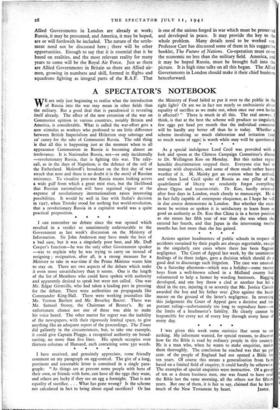I can remember no debate since the war opened which
resulted in a verdict so unanimously unfavourable to the Government as last week's discussion on the Ministry of Information. Sir John Anderson may have made the best of a bad case, but it was a singularly poor best, and Mr. Duff Cooper's function—he was the only other Government speaker —was to explain why he was trying to carry on instead of resigning ; resignation, after all, is a strong measure for a Minister to take in war-time if the Prime Minister wants him to stay on. There are two aspects of the debate which make it even more unsatisfactory than it seems. One is the length of the list of Members who could have spoken with authority and apparently desired to speak but were not called. One was Mr. Edgar Grenville, who had taken a leading part in pressing for the debate. There were authorities on propaganda like Commander King-Hall. There were working journalists like Mr. Vernon Bartlett and Mr. Beverley Baxter. There was Mr. Samuel Storey, the Chairman of Reuter's. By an unfortunate chance not one of these was able to make his voice heard. The other matter for regret was the inability of the newspapers, with their rigorously limited space, to give anything like an adequate report of the proceedings. The Times did gallantly in the circumstances, but, to take one example, it could give Captain Plugge, a recognised authority on broad- casting, no more than five lines. His speech occupies over thirteen columns of Hansard, each containing some 350 words.


























 Previous page
Previous page